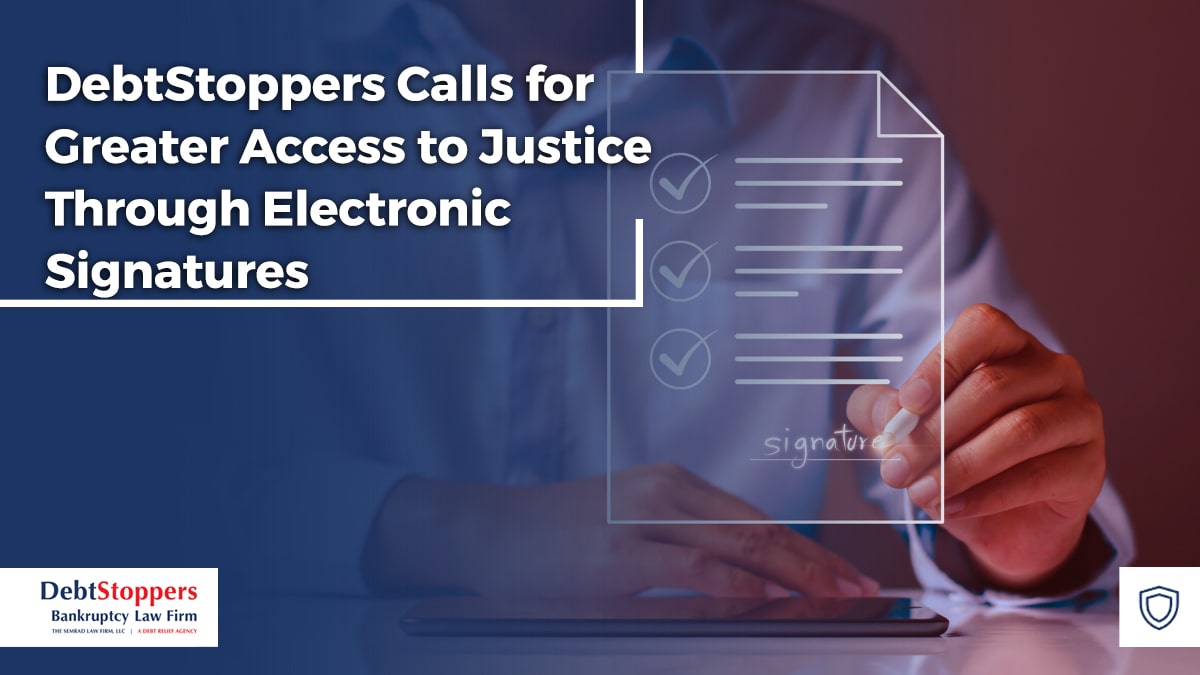DebtStoppers Calls for Greater Access to Justice Through Electronic Signatures

CHICAGO, IL – DebtStoppers calls upon the courts to expand access to justice by allowing the continued use of electronic signatures.
In recent years, the world experienced unprecedented challenges, pushing institutions to adapt and innovate. The judicial system, known for its reverence to tradition, was not exempt. Among the many changes that took place, one simple yet revolutionary innovation stood out – the adoption of electronic signatures in the Bankruptcy Court.
When COVID-19 rattled our normal way of life, courts across the nation scrambled to stay functional while ensuring safety. The Bankruptcy Court for the Northern District of Illinois, along with others, adopted several rules to facilitate this. One of the most impactful changes was permitting electronic signatures on bankruptcy pleadings through services like PandaDoc and DocuSign. The intent was clear and noble -- ensure access to justice in turbulent times.
What the courts perhaps did not anticipate was how this rule would open doors for a segment of the population perpetually stuck outside. The disabled, those residing in remote areas, individuals without transportation, or those unable to afford a day off from work could now more easily access the bankruptcy system. This change meant law offices could assist clients they had never reached before. It wasn't just about convenience but about breaking barriers that had existed long before the pandemic. The fear of rampant fraud with electronic signatures turned out to be largely unfounded. The system thrived; clients could manage their court proceedings without missing work, and the process became more streamlined.
However, as with many government-induced changes, the permanence of this policy was not guaranteed. To the dismay of many, the Bankruptcy Court for the Northern District of Illinois reverted its stance on electronic signatures, despite its evident success. This wasn't just a return to old practices, but a jarring refusal to acknowledge the benefits that had been realized.
Many courts nationally have recognized the value and made electronic signatures a permanent fixture. Yet, in Illinois, despite our best efforts, collaborating with fellow practitioners, government officials, trustees, and court clerks, our proposed rule to institutionalize electronic signatures was met with a firm “No”.
Detractors might argue electronic signatures merely ease the job for attorneys, reducing their administrative burdens. But the crux of the issue lies deeper. Obtaining signatures traditionally is difficult and burdensome for clients; whether it's taking a day off, managing expensive courier services, or wrestling with the logistics of printing and signing voluminous documents, the process is far from straightforward.
At its core, the justice system is built upon the tenets of fairness and accessibility. The pandemic provided a rare lens to view the system's adaptability and potential. By rolling back on electronic signatures, we're not just returning to an older way of doing things; we're actively shutting the door on those who could benefit the most. It's more than just a technological debate – it's about ensuring that every Chicagoan, every American, has equitable access to justice.